

Following the Money: Who’s in Control? Human beings are beginning to question the environment around them more so than ever before. Our capability to step outside of the box and observe events taking place on planet Earth from a neutral standpoint continues to increase at an exponential rate. Observing the entire Earth experience from an open mind has cleared the way for a change in perception, which has the potential to change our planet and the way we operate on it forever.
Political, media, food, education, health, energy and financial industries are now under intense scrutiny as people continue to let go of fear, speak up and ask more questions. ¿A QUIEN PERTENECE EL MUNDO? Al Fin la respuesta del por qué el Mundo está tan mal !
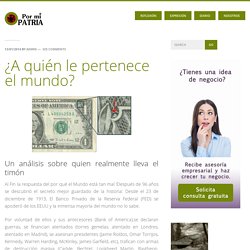
Después de 96 años se descubrió el secreto mejor guardado de la historia: Desde el 23 de diciembre de 1913, El Banco Privado de la Reserva Federal (FED) se apoderó de los EEUU y la inmensa mayoría del mundo no lo sabe. 1% II. Poverty Is No Longer a Priority for Nonprofits - Pablo Eisenberg. By Pablo Eisenberg In the last decade or so, nonprofits have stopped caring about the plight of the poor.
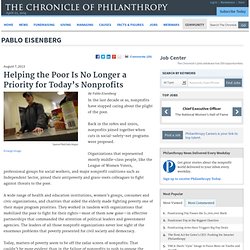
Back in the 1980s and 1990s, nonprofits joined together when cuts in social-safety-net programs were proposed. Organizations that represented mostly middle-class people, like the League of Women Voters, professional groups for social workers, and major nonprofit coalitions such as Independent Sector, joined their antipoverty and grass-roots colleagues to fight against threats to the poor. A wide range of health and education institutions, women’s groups, consumer and civic organizations, and charities that aided the elderly made fighting poverty one of their major program priorities. They worked in tandem with organizations that mobilized the poor to fight for their rights—most of them now gone—in effective partnerships that commanded the attention of political leaders and government agencies.
5 Indian Tech Companies You Need to Know. Remember mega-companies like Infosys and Wipro, which rode the software service tidal wave that took India by storm more than two decades ago?
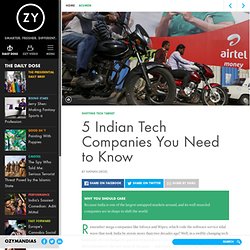
Well, in a swiftly changing tech landscape, the old Bangalore guard is tryna pull a 50 Cent and stay relevant. The Corporation : The Pathological Pursuit of Profit and Power. Banned TED Talk: Nick Hanauer "Rich people don't create jobs" Mega-rich Walmart heirs give almost none of their own money to Walton Family Foundation. Fiat Empire. The Congress shall have Power To coin Money, regulate the Value thereof, and of foreign Coin, and fix the Standard of Weights and Measures; No State shall make any Thing but gold and silver Coin a Tender in Payment of debts.
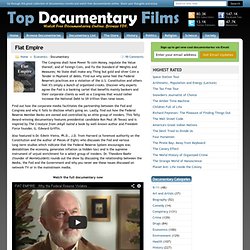
Find out why some feel the Federal Reserve's practices are a violation of the U.S. Constitution and others feel it's simply a bunch of organized crooks. Discover why experts agree the Fed is a banking cartel that benefits mainly bankers and their corporate clients as well as a Congress that would rather increase the National Debt to $9 trillion than raise taxes. English Poor Laws. The English Poor Laws[2] were a system of poor relief which existed in England and Wales[3] that developed out of late-medieval and Tudor-era laws being codified in 1587–98.
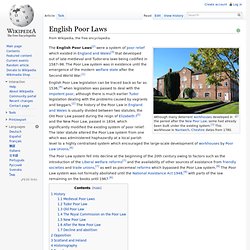
The Poor Law system was in existence until the emergence of the modern welfare state after the Second World War.[1] English Poor Law legislation can be traced back as far as 1536,[4] when legislation was passed to deal with the impotent poor, although there is much earlier Tudor legislation dealing with the problems caused by vagrants and beggars.[2] The history of the Poor Law in England and Wales is usually divided between two statutes, the Old Poor Law passed during the reign of Elizabeth I[5] and the New Poor Law, passed in 1834, which significantly modified the existing system of poor relief. History[edit] Medieval Poor Laws[edit] Aid in reverse: How poor countries develop rich countries. The idea of international development aid lies at the heart of a tremendously successful PR campaign.
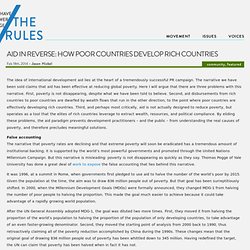
Actual Distribution of Wealth (U.S.) The One Percent. 97% Owned - Monetary Reform documentary - Directors Cut. Les super-riches d’aujourd’hui sont-ils des héritiers. Par Guillaume Nicoulaud.
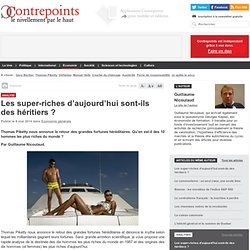
Thomas Piketty nous annonce le retour des grandes fortunes héréditaires et dénonce le mythe selon lequel les milliardaires gagnent leurs fortunes. Sans grande ambition scientifique, je vous propose une rapide analyse de la destinée des dix hommes les plus riches du monde en 1987 et des origines des dix hommes (et femmes) les plus riches d’aujourd’hui. En 1987, donc, lorsque Forbes publie son premier classement des milliardaires, cinq des dix hommes les plus riches du monde sont japonais et sont arrivés là grâce à leurs activités dans le secteur immobilier. Dans l’ordre : Yoshiaki Tsutsumi, l’homme le plus riche du monde avec une fortune estimée à (environ) 20 milliards de dollars, Taikichiro Mori (2ème, $15 milliards), Shigeru Kobayashi (4ème, $7,5 milliards), Haruhiko Yoshimoto (5ème, $7 milliards) et Yohachiro Iwasaki (9ème, $5,6 milliards).